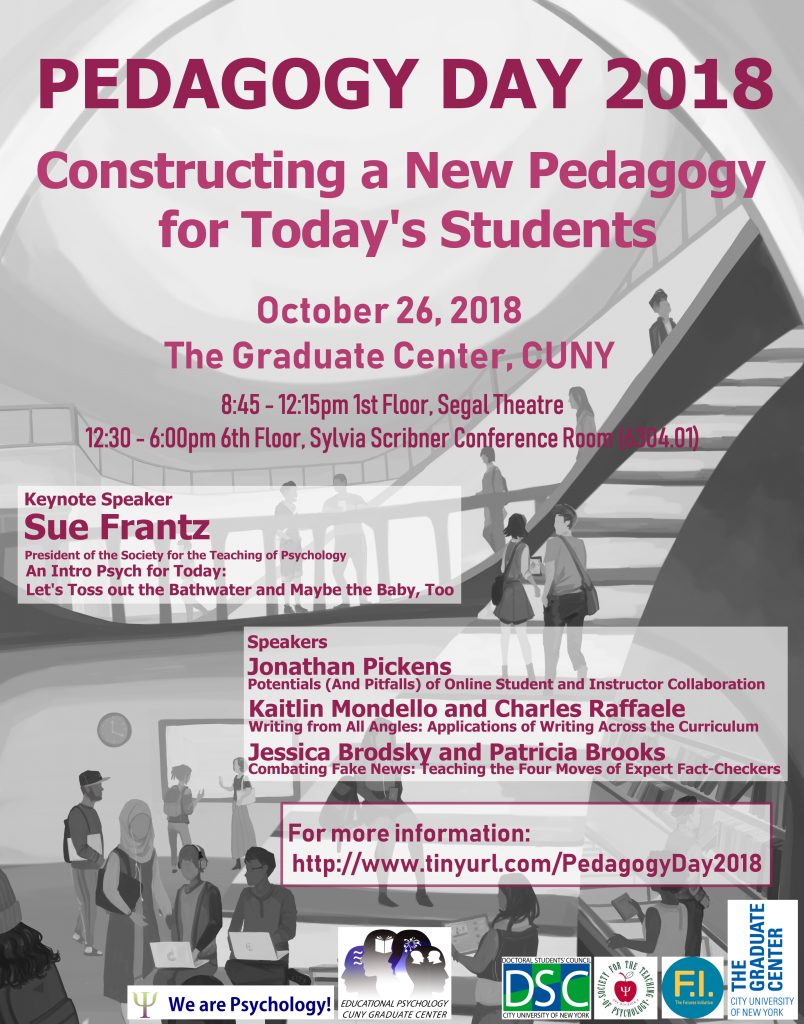9th Annual Pedagogy Day
Constructing a New Pedagogy for Today’s Students

Click here to register!
Pedagogy Day 2018
2018 Conference Theme
Pedagogy Day provides a forum for doctoral students and faculty to come together to think collectively about pedagogy and the Scholarship of Teaching and Learning (SoTL) in today’s diverse undergraduate classrooms. This year’s conference, titled “Constructing a New Pedagogy for Today’s Students,” will feature workshops on student-instructor online collaboration, writing across the curriculum, and ways to teach students how to become expert fact-checkers. The keynote “An Intro Psych for Today” will be given by Sue Frantz, President of the Society for the Teaching of Psychology. There will be complimentary breakfast and lunch, as well as a wine and refreshments reception.
Agenda
Morning Events: 1st Floor, Segal Theatre
8:45 a.m. – 9:15 a.m.
Registration and Breakfast
9:30 a.m. – 10:45 a.m.
“Potentials (and Pitfalls) of Online Student and Instructor Collaboration”
Jonathan Pickens
11:00 a.m. – 12:15 p.m.
Keynote Address: “An Intro Psych for Today: Let’s Toss Out the Bathwater and Maybe the Baby, Too”
Sue Frantz
Afternoon Events: 6th Floor, Sylvia Scribner Conference Room (6304.01)
12:30 p.m. – 1:00 p.m.
Food and Refreshments Available to All Attendees
1:00 p.m. – 2:15 p.m.
“A Day in the Life of a Reinvigorated Research Methods Course”
Kaitlin Mondello & Charles Raffaele
2:30 p.m. – 3:45 p.m.
“Combating Fake News: Teaching the Four Moves of Expert Fact-checkers”
Jessica Brodsky & Patricia Brooks
4:00 p.m. – 5:15 p.m.
Activity Blitz
5:30 pm. – 6:00 p.m.
Wrap-up and Reception
Presentations and Speakers
Keynote Address: “An Intro Psych for Today: Let’s Toss Out the Bathwater and Maybe the Baby, Too”
By Sue Frantz, President for the Society for the Teaching of Psychology
We’re well into the 21st century, yet our Intro Psych courses are firmly fixed in the 20th century. If undergraduate students from 50 years ago time-travelled to today’s classroom, they would not feel out of place. The technology is different, but the content and delivery are not. If we were to create an Intro Psych course from scratch, how would we go about it? We’d consider who is taking the course and how they are going to use what they learn. We’d consider the content of our field and sort through it to find the most important information to impart. We’d consider the skills we’d like our students to develop. We’d consider how to deliver that content and teach those skills. And we’d consider how students can best demonstrate that they’ve mastered that knowledge and those skills. Let’s imagine what a re-engineered Intro Psych course could look like.
“Potentials (and Pitfalls) of Online Student and Instructor Collaboration“
By Jonathan Pickens, Ph.D. Student in Psychology
Instructors have never had more tools to engage and connect with their students online. While these tools allow for a more creative and collaborative classroom, new instructors may hesitate to embrace them due to a growing digital divide and the prevalence of online threats (e.g. surveillance, data breaches, and online harassment). In this workshop we will go over some effective forms of online collaboration while also offering strategies to improve accessibility and reduce the potential risks students face. Through this critical and student-centered approach, participants will leave with a better understand of options available for facilitating online participation, and how their choices can better empower students. Participants are encouraged to bring a laptop or smartphone, as workshop activities will be demonstrating several collaboration tools to facilitate group discussions.
“Writing from all angles: Applications of Writing Across the Curriculum (WAC)“
By Kaitlin Mondello, Ph.D., Teaching and Learning Center, & Charles Raffaele, Ph.D. Student in Educational Psychology
This workshop introduces instructors to the principles of WAC (Writing Across the Curriculum). At the core of these pedagogical principles is the idea that students do not just learn to write, but also write to learn – continuous writing practice helps students not only improve their writing skills, but also better understand course material. In this workshop, we will explore ways in which we can bring writing into classrooms across the disciplines to create inquiry-based learning environments and encourage active engagement with course material. We’ll look at key WAC practices including scaffolding for high-stakes assignments using low-stakes writing, practicing minimal marking, and using rubrics when grading.
“Combating Fake News: Teaching the Four Moves of Expert Fact-checkers”
By Jessica Brodsky, Ph.D. Student in Educational Psychology & Patricia Brooks, Ph.D., Professor of Psychology
Student-centered pedagogies have demonstrated to be the most robust in learning outcomes through promoting active engagement, collaborative activities, and holistic learning. Inspired by this, Futures Initiative fellows will facilitate co-learning exercises that explore strategies that break from the transmission model of teaching/learning to engage student agency and creativity through active learning and scaffolding activities for and with students in the classroom. The aim of this collective experimentation is to illuminate creative classroom strategies that encourage total participation while attending to structural inequalities, with proven techniques such as think-pair-share and game-based pedagogies.
Pedagogy Day Committee
GSTA Co-Chairs
Teresa Ober
Elizabeth Che
Organizers
Jessica Brodsky
Sarah Frantz
Members of the Graduate Student Teaching Association (GSTA)
Faculty Advisor
Dr. Patricia Brooks, College of Staten Island and the Graduate Center, CUNY
Special thanks to…
Dr. Richard Bodner, Executive Officer of the Doctoral Program in Psychology
Swe Swe Htay and Psychology Executive Office Staff
All the volunteers that helped us make this conference a success!
The Pedagogy Day committee would also like to thank the following parties for their financial support:
Graduate Students Teaching Association (GSTA)
Society for the Teaching of Psychology (APA Division 2)
American Psychological Association Board of Educational Affairs (APA-BEA)
Doctoral and Graduate Students’ Council (DSC), CUNY


